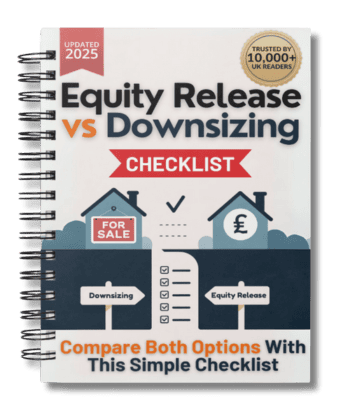
Is Equity Release Right For You in 2025? Ask Yourself These 8 Key Questions!
 Be aware. Equity release comes with drawbacks which are important to think about. Lifetime mortgages are secured loans. Compound interest means the amount you owe can grow quickly. Equity release reduces your estate's value and may impact means-tested benefits.
Be aware. Equity release comes with drawbacks which are important to think about. Lifetime mortgages are secured loans. Compound interest means the amount you owe can grow quickly. Equity release reduces your estate's value and may impact means-tested benefits.Key Takeaways...
- Equity release offers lump sum or regular income payments and boosts your finances significantly, but be aware that it may decrease your estate's value and could affect eligibility for state benefits.
- Whilst offering financial relief, it carries risks like potential negative equity and jeopardising means-tested benefits and state pensions.
- Committing to equity release often means you cannot sell your home unless you can repay the loan, possibly requiring other financial resources.
Is equity release right for me? is a question many UK homeowners face when looking to unlock the value tied up in their properties.
In 2023, the equity release market experienced a resurgence, with total lending reaching £716 million in the third quarter alone, benefiting 7,379 new customers and 8,466 returning drawdown customers.1 It's clear that this option has gained significant attention.
This article provides a comprehensive guide to help you assess whether equity release fits your unique situation and long-term goals, and at EveryInvestor, we aim to equip you with the information you need to make that informed decision.
Let’s dive into the details and help you decide...
In This Article, You Will Discover:
What Exactly is Equity Release?
Equity release is a financial solution that enables homeowners aged 55 and over to unlock the value of their property without selling it, allowing them to access a lump sum or regular payments while continuing to live in their home.
Equity release can be a useful way to supplement retirement income, fund home improvements, or cover other financial needs while maintaining homeownership.
There are 2 main types of equity release:
- Lifetime Mortgage – You take out a loan secured against your home, with repayment deferred until you pass away or move into long-term care.
- Home Reversion Plan – You sell a portion of your property to a provider in exchange for a lump sum or regular income while retaining the right to live there.
Is Equity Release Suitable For You?
Equity release can be a good option for a retiree homeowner who wants to unlock the value of their property without selling it, proving particularly beneficial for those with substantial home equity who need additional funds for retirement planning, home improvements, or debt repayment.

It’s important to consider the potential pitfalls, though; equity release can affect inheritance plans, eligibility for means-tested benefits, and the amount of equity left for future needs. Costs and interest accumulation should also be factored in.
Equity release can have many uses, so before proceeding, seek independent financial advice to explore alternative options that might potentially be more suitable.
8 Things You Must Consider to Determine: Is Equity Release Right For Me?
The 8 things you must consider when asking yourself, "Is it a good idea to release equity?", include questions like why you need access to capital, how much of it you require, and if you have explored alternative options.

Remember, this is a guide, not a substitute for professional equity release advice.
Here's a list of the 8 factors to consider:
#1. Understand Your Reasons For Considering Equity Release
Understanding your reasons for considering equity release is key to making the right financial decision, further highlighting the importance of seeking advice from an independent equity release adviser.
A 2023 SunLife survey found that many prospective borrowers use equity release for (in order of popularity) holidays (58%), home improvements (49%), or early retirement (25%).2
Others prioritise mortgage repayments (22%), family gifts (13%), or financial support for loved ones (13%).
Beyond this
Consider the emotional aspect; if staying in your family home is important, equity release can allow you to access funds without moving.
However, downsizing or renting out a room might be a more practical alternative, especially if you are property-rich but are looking for that later-life income solution.
Note: When answering the survey, respondents were allowed to choose more than one category to use their prospective equity release funds on.
#2. Consider How Much Equity You Need &For How Long
Considering how much equity you need and for how long is immensely crucial, which is why thinking about factors such as your long-term financial goals and the required amount is key at the start of your consideration process.
Once you have worked out how much money you will need, calculate how much equity you may be able to access and consider whether you will have enough to cover your projected expenses.
Follow these steps to make an informed decision:
- Define your long-term financial goals: Outline your reasons for releasing equity, such as supplementing retirement income, home improvements, or debt consolidation.
- Assess your future financial situation: Review your income, expenses, and savings to determine if additional funds are needed or if there are alternative ways to achieve your goals.
- Calculate the required amount: Consider potential future expenses or emergencies to estimate the money needed for your financial goals.
- Factor in loan duration: Determine the length of time you will need the funds, considering factors like age and life expectancy.
#3. Assess Your Income & Expenditure
Assessing your income and expenditure is key, because by doing so, you may find that adjusting your budget could be a better solution.
Here's t steps to obtain a clearer picture of your own finances:
- List all your income sources (e.g., salaries, pensions, investments).
- Divide your expenses into 2 categories: essential and non-essential.
- Track your spending to understand habits and identify areas for change.
- Analyse your cash flow by subtracting all your expenses from your income.
- Set realistic short-term and long-term financial goals.
- Create a budget reflecting your goals, income, and expenses.
- Review and revise your budget regularly.
#4. Determine Affordability
Determining affordability is essential when considering equity release—or any financial decision—and while it provides access to funds, it comes with costs that may make other borrowing options more economical.
One major consideration is early repayment charges, which can significantly reduce the value of your estate if you choose to repay the loan early, potentially making equity release less flexible than other financial solutions.
#5. Consider The Potential Impact On The Value Of Your Estate
Considering the potential impact on the value of your estate is key, especially when planning for inheritance or future financial decisions, as factors such as changes in property values, inflation, and market fluctuations can all influence the overall value of your estate.
Potential effects include, but may not be limited to:
- Reduced inheritance: Equity release reduces the equity in your property, which in turn decreases the value of your estate, so your beneficiaries may receive a smaller inheritance than they would have otherwise.
- Interest accumulation: The longer the loan is outstanding, the more interest accumulates, further reducing the value of your estate.
- Property value changes: If the value of your property increases significantly, it may help offset the impact of the equity release, but if property prices decline, the impact on your estate could be more substantial.
#6. Think About Your Future Plans & Goals
Thinking about your future plans and goals may seem like an obvious step, but it one that can easily be overlooked when you are worried about your retirement finances.
What are your expectations for your retirement?
Consider factors such as:
- Retirement lifestyle: Envision your desired retirement and assess if equity release can support it.
- Healthcare needs: Evaluate if equity release can cover potential future healthcare costs and if you need to save the option for emergency funds at a later stage.
- Family support: Assess if you have family members you may need to support and if equity release can help with this.
- Inheritance: Consider the impact on your estate and communicate with your family.
#7. Explore Potential Alternatives To Equity Release
Exploring potential alternatives to equity release is a step that might just show you that an alternative financial tool to equity release may better suit your financial goals.
Downsizing to a smaller property could free up funds without the long-term commitment of a loan, while renting out a portion of your home can generate income without affecting your estate.
Using your savings or investments might also be a viable way to meet financial needs without the complications of equity release.
#8. Seek Independent Financial Advice
Seeking independent financial advice is probably the most important factor of them all when considering equity release or any major financial decision; professional advice should be sought after.
An independent financial advisor (IFA) registered with the Financial Conduct Authority can assess your personal situation, provide unbiased guidance, and recommend the most suitable financial products or solutions.
Their expertise ensures you make informed decisions that align with your financial goals and minimise potential risks.

Common Questions
Equity release can provide older homeowners with a way to access the value of their property without having to sell it.
The pros include the ability to supplement retirement income, remain in one’s home, and have a tax-free lump sum.
However, it is important to consider the cons such as potential reduction in inheritance, impact on means-tested benefits, and the long-term cost of interest.
It is advisable to seek independent financial advice to understand if equity release is the right option for your individual circumstances.
Equity release allows homeowners aged 55 and above to unlock the equity tied up in their property.
There are two main types: Lifetime mortgages and home reversion plans. With a lifetime mortgage, you can borrow against the value of your home whilst retaining ownership.
The loan, plus interest, is repaid when you sell your home or pass away. Home reversion plans involve selling a portion or all of your property to a provider whilst retaining the right to live there rent-free until you move out or pass away.
Yes, there are risks associated with equity release.
It is crucial to understand that releasing equity from your home reduces the value of your estate and the amount you can pass on as inheritance.
It can also impact means-tested benefits, as the released funds may be considered as income or assets.
Seeking independent advice from a qualified equity release specialist is essential to assess the risks and benefits specific to your situation.
Equity release can affect your pension and means-tested benefits.
Releasing equity from your home could potentially impact the amount of pension you receive, as it may be considered as income or assets.
It can also affect means-tested benefits such as pension credit, council tax support, and universal credit.
It is crucial to understand the potential implications and seek advice from a specialist who can evaluate your individual circumstances and provide guidance on how equity release may impact your pension and benefits.
Yes, you can sell your home after taking an equity release, but it is important to consider the terms of your specific equity release plan.
With a lifetime mortgage, you have the flexibility to sell your home and repay the loan, along with any accrued interest.
However, if you have a home reversion plan, selling your home may require repaying the provider their share of the property’s value.
It is advisable to carefully review your equity release plan and seek professional advice to understand the implications of selling your home in relation to your specific arrangement.
Equity release affects your beneficiaries by reducing the value of your estate, leading to a smaller inheritance.
As the loan and accumulated interest are repaid using the proceeds from the sale of your property, the remaining equity for your beneficiaries decreases.
Yes, you can change your mind about equity release after you sign up, but it may be difficult and costly.
Because lifetime mortgages take several weeks to take effect after initial application, homeowners have this time to change their minds.
After this period, cancelling or switching to a different plan could result in substantial Early Repayment Charges.
Note
Some providers may offer a cooling-off period, like Saga’s six-month money back guarantee.7
It is essential to understand the terms and conditions of your chosen plan thoroughly and to seek independent financial advice before making any commitments.
If you move or want to sell your property after taking out an equity release plan, you can either repay the loan with the sale proceeds or transfer the loan to a new property if your provider approves of it.
Always consult a financial advisor to understand the terms and conditions related to moving or selling, and choose a plan that suits your future plans.
It normally takes eight to twelve weeks to set up equity release.8
The length of time depends on several factors, such as property valuation, legal processes, and the complexity of your financial situation.
Equity release impacts Inheritance Tax by reducing the value of your estate.
As the equity release loan will diminish the value of your estate, taking out this kind of plan could potentially lower your beneficiaries’ Inheritance Tax liability.9
In Conclusion
Equity release can be a valuable tool for homeowners looking to unlock the wealth tied up in their property, but it’s essential to approach it with careful thought and consideration.
It’s not just about equity release—it’s about weighing all available options and consulting an independent financial adviser who will provide the guidance you need to navigate these choices with confidence.
Ultimately, making the right decision comes down to understanding your needs, the impact on your estate, and ensuring the solution fits your future.
So, take your time, seek expert advice, and ask yourself: is equity release the right step for you?

Found an Error? Please report it here.





 100% private. No pressure. Just friendly guidance.
100% private. No pressure. Just friendly guidance.


